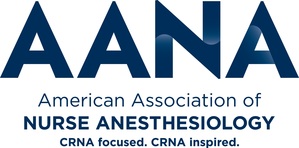CRNAs Are the Primary Anesthesia Providers for Colonoscopies in Rural Areas
ROSEMONT, Ill., March 12, 2024 /PRNewswire/ -- (AANA) –Of the various types of cancer screenings and procedures, colonoscopies are among the most effective in preventing cancer. Regular screenings can find colorectal cancer either when it is small, has not spread, and might be easier to treat, or find and remove pre-cancerous growths called polyps before they develop into cancer.
The American Association of Nurse Anesthesiology (AANA) is urging patients during Colorectal Cancer Awareness Month to talk to their healthcare provider about the screening test best for them. Certified Registered Nurse Anesthetists (CRNAs), also known as nurse anesthesiologists or nurse anesthetists, provide anesthesia during colonoscopies, procedures that help find and remove pre-cancerous growths called polyps before they develop into cancer.
The guidelines for when screenings for colorectal cancer should begin have been recently updated. The American Cancer Society now recommends people at average risk for colorectal cancer begin screenings at age 45. Those with a family history of colon cancer may start screenings even earlier as studies show rates of colorectal cancer among people younger than 50 are on the rise and expected to almost double by 2030.
"Having colon screenings beginning at the recommended ages is the best way to help prevent colon cancer or to be able to treat it at its earliest stages, "said Garry Brydges, PhD, DNP, MBA, MHA, CRNA, ACNP-BC, FAANA, FAAN, director of Quality and Outcomes in Anesthesia at MD Anderson Cancer Center in Houston, Texas. "Colonoscopies remains the gold standard for colon screenings. CRNAs represent more than 80% of the anesthesia providers in rural areas, and they provide the safety and care to help patients through this important preventative procedure."
Brydges says it is important to talk to your healthcare provider to discuss a plan for screenings and in terms of proactive, preventable practices, maintain a healthy diet and lifestyle to reduce your risk for colorectal cancer.
Sedation for any invasive procedure increases the complexity of care. CRNAs provide high-quality, safe, sedation and anesthesia care. They focus solely on ensuring that patients are safely monitored during the procedure.
"Each patient has a unique response to treatments utilizing anesthesia. As anesthesia experts, CRNAs are available to continuously monitor the patient and can focus on changes in the patient's condition and intervene as necessary in emergent situations," said Brydges. "A pre-procedure discussion of the anesthesia delivery plan is important to address any concerns, and CRNAs play a vital part in providing a safe anesthesia environment for the patient throughout this important screening procedure."
SOURCE American Association of Nurse Anesthesiology

WANT YOUR COMPANY'S NEWS FEATURED ON PRNEWSWIRE.COM?
Newsrooms &
Influencers
Digital Media
Outlets
Journalists
Opted In



Share this article